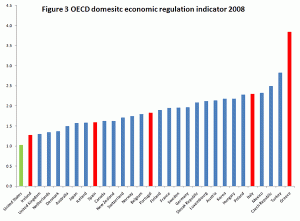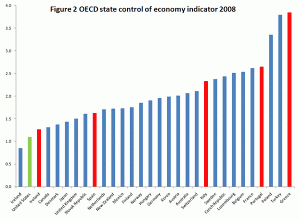In his Nov. 3 column, Luke Phillips introduced “Lukenomics,” his “particular brand of economic policy thought.” Luke cited three main pillars to a healthy economy: public investment, market forces and effective public institutions. Quite frankly, I couldn’t agree with him more.
But one line especially caught my attention. Luke referred to the importance of “maintaining a stable financial and legal climate, so as to make the economic terrain more palatable for investment and activity.” Which made me wonder — how regulated is our economy, really?
One measure is Product Market Regulation, an index measuring the ease of doing business in a country. Several factors are considered, including the barriers to entry for entrepreneurs, the ability to start (or shut down) companies, the opportunity to grow, etc. It’s one way of looking at the financial and legal climate. And as it turns out, the United States looks pretty good.
Comparing the data from 2008, the last year when all the countries in the OECD reported, only the Netherlands had a lower PMR index than us — 0.96 to 1.11. Of the rest of the countries in the OECD, only the United Kingdom (1.21) and New Zealand (1.23) were below 1.30.
But looking at the numbers in a slightly different way, America’s weight of economic regulation gets even  lighter. The picture the data paint is of an open, flexible, entrepreneurial economy capable of rapid expansion under the right conditions. Compared to most other developed nations, we tend to have a far more permissive business environment.
lighter. The picture the data paint is of an open, flexible, entrepreneurial economy capable of rapid expansion under the right conditions. Compared to most other developed nations, we tend to have a far more permissive business environment.
Yet few of us would call our current economic performance wholly satisfactory. We’ve certainly made significant progress recovering from the Great Recession, and we’ve at least righted the ship. But it’s sailing slowly; some say it’s even drifting. What’s holding us back?
One argument blames the size of our government. According to this line of thinking, overbearing and inefficient state control of our economy is diverting necessary resources away from the sectors where the market would naturally deploy them. But here again, the data show we have (comparatively) a very light touch; only Iceland has less state control of their economy than the United States, and our index is about half of some of the more advanced economies, including Germany and Korea.
market would naturally deploy them. But here again, the data show we have (comparatively) a very light touch; only Iceland has less state control of their economy than the United States, and our index is about half of some of the more advanced economies, including Germany and Korea.
So by any real measure we’re still a thoroughly capitalist country. I’ll address issues like the imbalances in our tax code, regulatory capture, the actual size of our government and some of the other key issues in future columns. For now, I just want to address Luke’s three pillars in purely philosophical terms.
For me, the role of government regulation in the economy is a lot like the role of the NFL in football. The league sets the boundaries of the field and establishes the rules of the game, which it enforces through its referees and the league office. But the teams have to fight it out between them to determine the winners and losers. That spirit of fair competition according to established, recognized rules is central to free market capitalism — Adam Smith himself, in The Wealth of Nations, acknowledged the role of government in regulating economic activity. The free market was never meant to be a free-for-all.
But of course an economy isn’t a game, and real livelihoods — and lives — are at stake when we’re talking about the organization of our economic affairs. One approach I’ve always found appealing is German ordoliberalism, which did so much to speed Germany’s recovery after the devastation of World War II. That’s especially true when you contrast East and West Germany before the fall of the Berlin Wall, and then look at the progress the unified country made afterward.
A central tenet of ordoliberalism is the idea the government is responsible for creating the proper legal and regulatory environment to actively foster competition. Monopolies (and the translation of concentrated economic power into concentrated political power) must be prevented, a strong social safety net must be maintained to create a firm social foundation and reduce the pressures on individuals and families, and public institutions must be strong, vibrant, responsive and efficient.
It’s a philosophy I think we can learn a lot from. Government spending and regulation aren’t dogmatically rejected as “interference” in the economy, and the social safety net isn’t designed as a free pass. What’s more, labor and management are treated as common stakeholders rather than opponents. The idea is for a structured economy where capitalism reigns, but without the sharp edges which can result in so much suffering when the darker forces of greed and materialism are not only unrestrained, but unleashed. It’s a view which understands, respects and nurtures the profit motive — without glorifying it.
And that’s a good thing.
Kevin J. Rogers is a freelance writer and journalist, contributing editor at The Henry Clay Institute and a contributing writer at The Editorial Review. He is the former Director of Policy Research and national vice-chair of The Modern Whig Party of America. Opinions expressed are his own.
Pingback: Nuclear Energy vs. the Free Market | The Henry Clay Institute